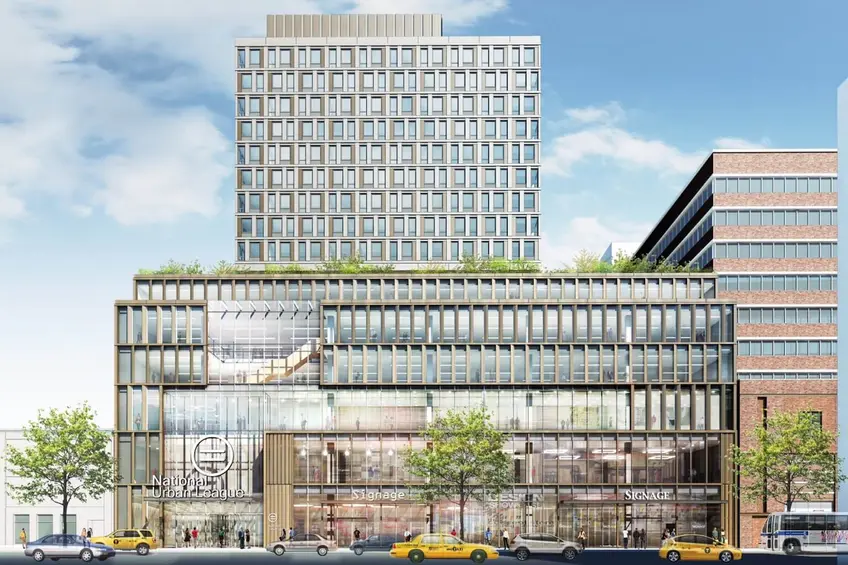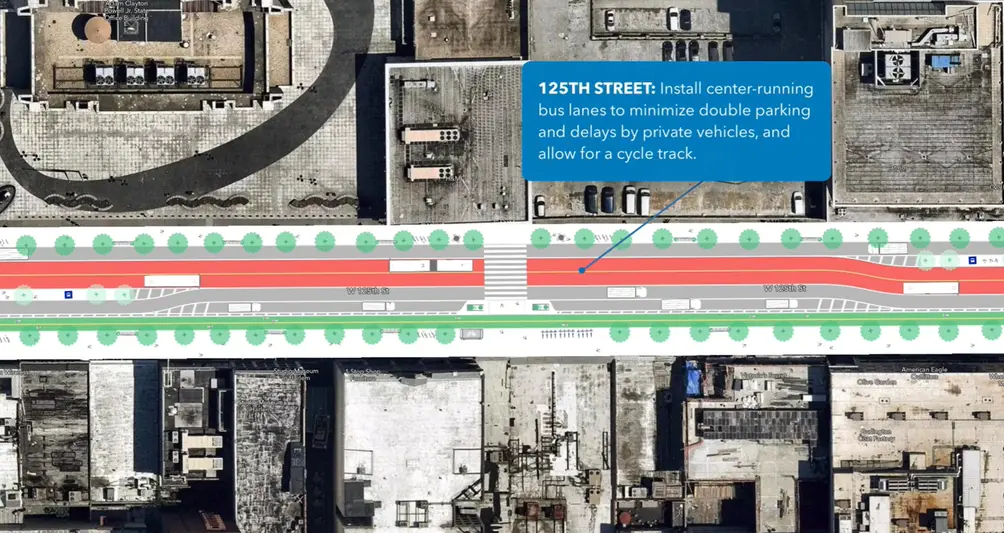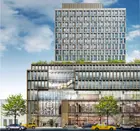 125th Street elevation
125th Street elevation
In 1910, the National Urban League was founded in Harlem with the goal of elevating the standards of living for African Americans and other underserved groups. More than 100 years later, the National Urban League has 90 affiliates serving 300 communities in 37 states and the District of Columbia. Direct services like educational programming, job training, housing development, and health program Project Wellness improve lives at the community level; at a national level, they advocate for voting rights, economic empowerment, and other policies to close the equality gap.
Additionally, following a request for proposals from Empire State Development and the New York City Economic Development Council, the National Urban League's headquarters will return to Harlem with the National Urban League Building, located at 121 West 125th Street. A groundbreaking ceremony took place in March 2021 with then-Governor Cuomo, the Honorable Charles Rangel, and Congressman Adriano Espillat among the dignitaries and officials in attendance. Less than a year later, and during Black History Month, construction has topped out at 17 stories high.
The setback tower designed by Beyer Blinder Belle is already evident; next to go up is the glass tower with varying transparencies (most transparent for retail space and least transparent for residential, per the architect’s website). Completion is estimated for 2023.
The setback tower designed by Beyer Blinder Belle is already evident; next to go up is the glass tower with varying transparencies (most transparent for retail space and least transparent for residential, per the architect’s website). Completion is estimated for 2023.
In this article:
“New York City is where we were born, and I am proud that New York City is where we will stay. I am even more excited about the neighborhood economic development our new home represents.” - Marc H. Morial, President and CEO, National Urban League
 Renderings via MAQE/Beyer Blinder Belle
Renderings via MAQE/Beyer Blinder Belle
The National Urban League’s headquarters will measure approximately 42,000 square feet and feature a balcony overlooking 125th Street’s vibrant streetscape. The site will also be home to the 19,500-square-foot National Urban League Institute for Race, Equity, and Justice conference center, as well as the Urban Civil Rights Museum, which will focus on the contributions of civil rights activists in the northern part of the United States.
The Urban League Empowerment Center’s retail and office space seeks to entice tenants who will offer jobs and resources for the neighborhood. So far, Target and Trader Joe’s (the first in Harlem) have signed on as anchor retail tenants; the development will also provide below-market rate office space to nonprofits like the Harlem-based Jazzmobile, the New York chapter to 100 Black Men of America, and the United Negro College Fund. Finally, the residential component will include over 170 units of affordable housing for New Yorkers earning 30 to 80 percent of the area median income, as well as supportive housing for young adults aging out of foster care.
 Transportation Alternatives' NYC 25x25 vision: https://nyc25x25.org/manhattan.html
Transportation Alternatives' NYC 25x25 vision: https://nyc25x25.org/manhattan.html
“Our neighborhood is a connective tissue for crucial (and crowded!) subway lines, bus routes, bike lanes, and river pathways that connect Upper Manhattan to the Bronx to the rest of the island and the city. We owe it to ourselves, and our neighboring districts to get this right!” - Kristin Richardson Jordan, New York City Councilwoman
The site is located up the street from the 125th Street 2 and 3 stop and two blocks east of the 125th Street A/B/C/D subway stop. However, a proposal announced in December 2021 calls for moving the beleaguered bus lane into the center of 125th Street to allow for faster travel, adding a two-way bike lane, and planting trees along both sides of 125th Street and a new central median. The proposals are consistent with the citywide 25x25 initiative, which calls for shifting 25 percent of the city’s streets away from private cars by 2025, and would be instrumental in combating 125th Street’s ignominious status as one of the nation’s deadliest streets for pedestrians. Newly elected City Councilmember Kristin Richardson Jordan, a longtime Harlem resident who now represents the neighborhood as part of her district, has voiced her support for the plan.


 6sqft delivers the latest on real estate, architecture, and design, straight from New York City.
6sqft delivers the latest on real estate, architecture, and design, straight from New York City.
